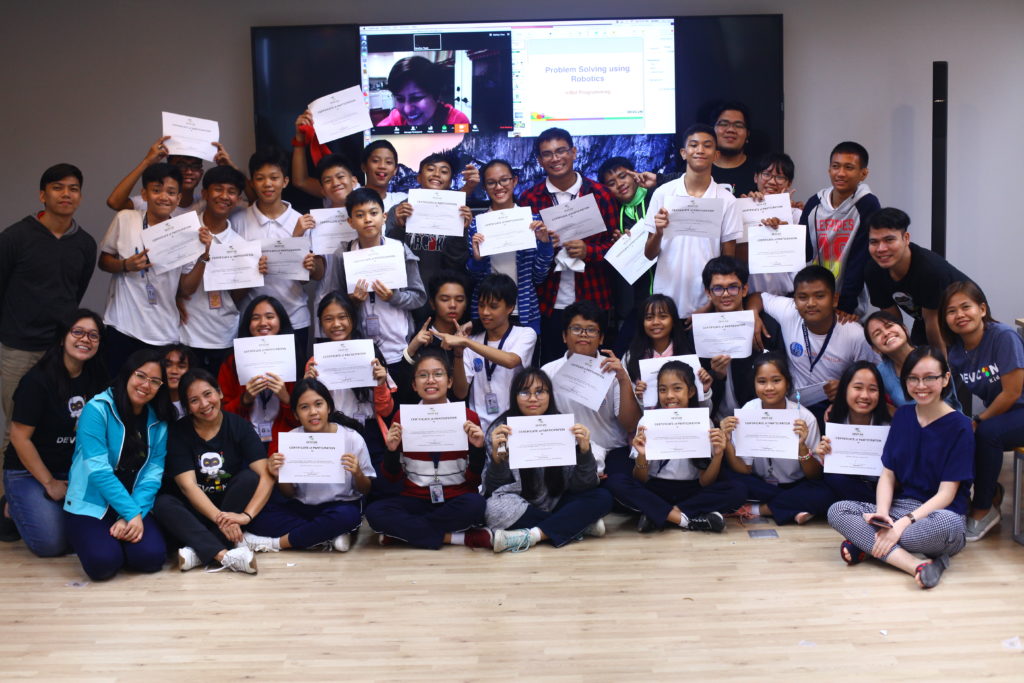
A total of 30 students from Mano Amiga Academy completed the full-day robotics lesson under the DevCon Kids program led by mentors from DevCon Philippines. /Contributed Photo
In 2018, the World Economic Forum ranked the Philippines 53rd among 63 countries in terms of digital competitiveness. A report from the Department of Education (DepEd) further states that only 26 percent of public schools in the country have internet access.
Add to this picture the fact that the current school curriculum only offers computer programming in senior high school for the Information and Communications Technology (ICT) strand of the Technical Vocational Track. There is also a lack of ICT devices in many schools nationwide as computer laboratories are still being built.
The quality of ICT education in the Philippines is definitely a pressing concern, with education stakeholders repeatedly calling for capacity-building for teachers, allocating sufficient resources, and partnering with the private sector to accelerate ICT education.
One learning institution that is taking concrete steps in making this change happen is a small non-profit K-to-12 school for students from low-income families, Mano Amiga Academy, which offers international quality education to help marginalized youth cope with and even become globally competitive in today’s digital environment.
‘Life-proofing our students’
Mano Amiga Academy’s teaching philosophy takes an innovative approach to fulfilling the educational needs of today’s youth. This includes project-based learning (PBL), a method that develops critical thinking, communication, and collaboration in students as they work together to solve the problems that are relevant to their communities.
“PBL is just one of the many means by which we are life-proofing our students so that they are equipped to deal with real problems,” said Lynn Pinugu, executive director and founder of Mano Amiga. “Nevertheless, bridging technological gaps still requires external support. For instance, our school still lacks a computer laboratory, a stable internet connection, and other tech tools.”
Students learned to assemble and program mBots, which are educational robot kits designed for kids who are just starting to learn about robot software. /Contributed Photo
In spite of these limitations, Mano Amiga Academy made a decision to equip their students with digital competence. They collaborated with Developers Connect Philippines (DevCon), an organization dedicated to promoting information technology in the country by bringing tech professionals together to actively provide digital opportunities to more Filipinos.
Mano Amiga Academy and DevCon piloted a program, called DevCon Kids, that seeks to impart technology skills to students at an early age. The program led to the formation of a DevCon Club, which now counts 30 members selected from grades seven to nine who possess a certain level of aptitude and knowledge in science and math. Every week, DevCon Kids mentors discuss lessons, such as coding and design thinking, specifically developed for the program.
One of these mentors is Joel Bautista, who is also a full-time computer science teacher at the Philippine Science High School. A Lead Instructor for DevCon Kids, Joel joined the program’s core team because he believed in their advocacy of teaching kids life skills that are beyond the basic skills of reading, writing, and arithmetic.
“We are in the 21st century and we want to instill computer science skills, problem solving, creativity, and collaboration in today’s kids,” said Joel. “Our goals and those of Mano Amiga are parallel—we’re both serving the underserved. We are aware that they don’t have computer labs like other schools do and it’s DevCon’s way of extending help by teaching these new topics.”
Inclusive digital competitiveness
Mano Amiga Academy students and DevCon Club members JC Gorgonio and Cheska Andes share their excitement about the program.
Cheska has always enjoyed language classes the most, getting her best grades in English and Filipino, but after joining DevCon Club, her grades in Math and Science started improving.
“I signed up for DevCon Club because we don’t have a computer at home and I wanted to know more about how computers and the internet worked,” said Cheska.
Lead Instructor Joel Bautista (middle) volunteers for the DevCon Kids program to bring ICT education closer to underprivileged youth. /Contributed Photo
A highlight in the DevCon Kids program is a full-day lesson in robotics. The students were paired up and provided an mBot each. mBots are educational robot kits designed for kids who are just starting to learn about robot software. The students learned how to program their robots and create codes to make them move, transmit a sound if it senses light, navigate and follow a track, and even wrestle against another robot.
“Honestly, our first few lessons in DevCon Club were really hard. My friends and I almost quit but we kept going because of our cheerful mentors and our supportive student affairs coordinator,” said JC, a grade seven student. “We’re also excited for our next lesson on making mobile apps.”
Seeing the success of their pilot program and the positive feedback from the students, Mano Amiga Academy and DevCon plan to continue what they have started to reach more children and expose them to computer science and information technology.
Mano Amiga Academy will continue running DevCon Club, and encourage the older students to transmit their learning to incoming grades seven to nine students.
“We are very thankful for DevCon’s commitment to make computer science accessible to more of our young people. They’ve provided all the requirements for our students, easing their worries over having to acquire the laptops and other equipment themselves,” said Lynn.
“We will replicate DevCon Kids one school at a time, applying insights from the pioneer batch in developing a hybrid program that we will use for future beneficiaries. We hope to work with donors as well, as running the program requires a lot of resources—laptops, high-speed WiFi, and a facility conducive to the learning,” said Shumate Royo, managing director of DevCon Philippines.
With programs like DevCon Kids, ICT education becomes available to more children from all social strata, paving their way to digital competitiveness./dcb